Best credit cards for emergencies

If you need help dealing with unexpected expenses, you’re not alone. More than 2 in 3 U.S. adults (69 percent) would be worried that they wouldn’t have enough emergency savings to cover a month’s living expenses if they lost their primary source of income, according to Bankrate’s 2025 Annual Emergency Savings Report.
When an emergency happens and you don’t have an emergency fund to help, a credit card may be your next best option. Credit cards offer a line of credit that can help you cover expenses, from home and auto repairs to medical bills. Some have additional features like sign-up bonuses and bonus rewards on everyday purchases. In some cases, you can even work on paying off your debt without having to worry about interest charges temporarily.
To learn more, including how to choose the right card and possible alternatives, check out our picks for best emergency credit cards.
Top credit cards for emergencies
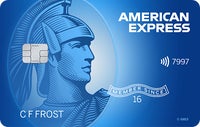
Blue Cash Everyday® Card from American Express
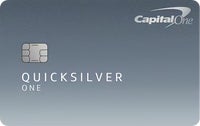
Capital One QuicksilverOne Cash Rewards Credit Card
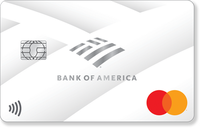
BankAmericard® Credit Card
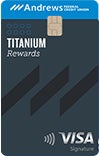
Titanium Rewards Visa® Signature Credit Card
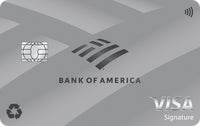
Bank of America® Unlimited Cash Rewards credit card for Students
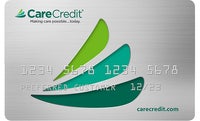
CareCredit credit card
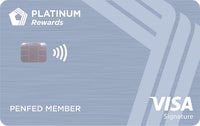
Platinum Rewards Visa Signature® Card
Comparing the best cards for emergencies
| Emergency credit card | Recommended Credit Score | Annual Fee | Best for | Top features |
|---|---|---|---|---|
| Blue Cash Everyday® Card from American Express | Good to excellent | $0 | Instant access to credit |
|
| Capital One QuicksilverOne Cash Rewards Credit Card | No credit history needed | $39 | Food and household emergencies |
|
| BankAmericard® credit card* | Good to excellent | $0 | Paying off emergency debt |
|
| Titanium Rewards Visa® Signature Card from Andrews Federal Credit Union* | Good to excellent | $0 | High credit limit and low APR |
|
| Bank of America® Unlimited Cash Rewards credit card for Students* | Good to excellent | Emergency card for students |
|
|
| CareCredit* | N/A | $0 | Medical emergencies |
|
| Platinum Rewards Visa Signature® Card* | Good to excellent | $0 | Emergency cash advances |
|
Clicking on a card name in the table above will direct you to its Bankrate review to learn more. Rewards cards typically require a good-to-excellent credit score. If you have bad or fair credit, consider our top picks for fair/average credit.
How to choose a credit card for emergencies
The problem with borrowing money to deal with an emergency is that you have to pay it back, usually with interest. Those interest charges can cost you hundreds of dollars or more and can make it harder to pay off your credit card debt. That’s why it’s a good idea to have a plan to pay back what you borrow.
There are a lot of credit cards available, but not all of them can help you in an emergency. Check out the following advice to find the right emergency card for you.
Know your credit score
Check your credit score to help identify the credit cards you qualify for and the interest rates you’re likely to pay. The better your credit score, the more options available with lower rates.
Determine the type of emergency card you need
Finding that perfect emergency credit card that covers every type of emergency may not be possible. To make sure you apply for a credit card that best fits your needs, know which of the following factors are most important to you:
- Instant use
- High credit limit
- Low- or no-interest payments
- Open to people with no credit, fair credit or bad credit
- Sign-up bonus and rewards
- No penalty APR
See if you prequalify
Prequalifying for a credit card can show you if you are likely to be approved without impacting your credit score. Some credit card issuers let you prequalify on their website, or you can use a tool like Bankrate’s CardMatch to help you find offers you are likely to qualify for.
Pay attention to the rates and fees
Before you apply for a card, take a look at the card’s APR (or interest rate). Then use a credit card payoff calculator to get an idea of how long it will take to pay off potential debt and how much interest you’ll pay. Compare that to what you would pay if you took out a personal loan. Also look to see what additional fees come with the card, like late fees or balance transfer fees. Watch out for penalty APRs — some issuers will increase your APR if you make a late payment, and it could last 12 months or longer.
How to maximize an emergency credit card
Here are some tips that will help you manage your emergency credit card effectively and protect your credit score.
Pay on time
Always pay your credit card bill on time. Late payments can lead to unnecessary fees and penalty APRs which can make it harder to pay off your debt. It can also lead to negative marks on your credit report that stay there for up to seven years or longer.
Pay more than the minimum
You could be stuck in debt for a long time if you only make minimum payments on a credit card. To avoid the credit card debt cycle, try to make paying off your emergency debt a top priority. Find a budget strategy that works for you so you can track where your money is going. Look for ways to quickly save money that can be put toward paying more than your minimum payments. And for more help, check out our guide to budgeting basics.
Try to avoid paying interest for as long as possible
Credit cards with zero-percent intro APR offers give you time to pay off large purchases or debt — anywhere from 12 to 21 months — without having to spend more money on interest charges. Many of these cards charge no annual fee and are one of the few options available that give you the chance to borrow money from a lender and pay it back without having to pay any fees or charges.
Alternatives to emergency credit cards
Credit cards are good for some emergencies, but they won’t be the best option for everyone. Here are two alternatives that could help when an emergency arises.
Emergency fund
An emergency fund is money you set aside for unplanned or emergency expenses. In most cases, it’s the cheapest and best option for handling an emergency since you’re using your own money and won’t have to worry about interest charges.
But for some, saving up money is no easy task. According to a Bankrate survey, just 44 percent of Americans have enough savings to help cover a $1,000 surprise expense. However, small savings, such as the 52-week budgeting challenge, can add up over time.
Personal loan
An emergency personal loan may also be an option worth considering. Lenders like Upgrade offer personal loans for up to $50,000 that can be used to cover unexpected expenses, so a personal loan versus a credit card could suit your needs better.
If you have a high enough credit score and a low debt-to-income ratio, you could qualify for a personal loan with an APR that is much lower than the typical regular APRs of credit cards. It’s also possible to get a personal loan with bad credit, though you’ll likely have to deal with high interest rates and it might be delayed one to four days before you can start using your funds.
What’s next?
Use Bankrate’s resources to help manage credit card debt.
Bottom line
If you don’t have the funds to cover an unexpected expense, an emergency credit card can help. The best emergency credit cards have features that give you a fighting chance to handle whatever comes your way, including instant card numbers upon approval, high credit limits and forgiving APRs. In some cases, they can be low-cost options that give you time to pay back your debt without the burden of interest charges.
The Bank of America content in this post was last updated on November 3, 2025.
*The information about the BankAmericard® credit card, Bank of America® Unlimited Cash Rewards credit card for Students, CareCredit credit card, Titanium Rewards Visa® Signature Card from Andrews Federal Credit Union and Platinum Rewards Visa Signature® Card has been collected independently by Bankrate. The card details have not been reviewed or approved by the card issuer.
Frequently asked questions about emergency credit cards
Why we ask for feedback Your feedback helps us improve our content and services. It takes less than a minute to complete.
Your responses are anonymous and will only be used for improving our website.








